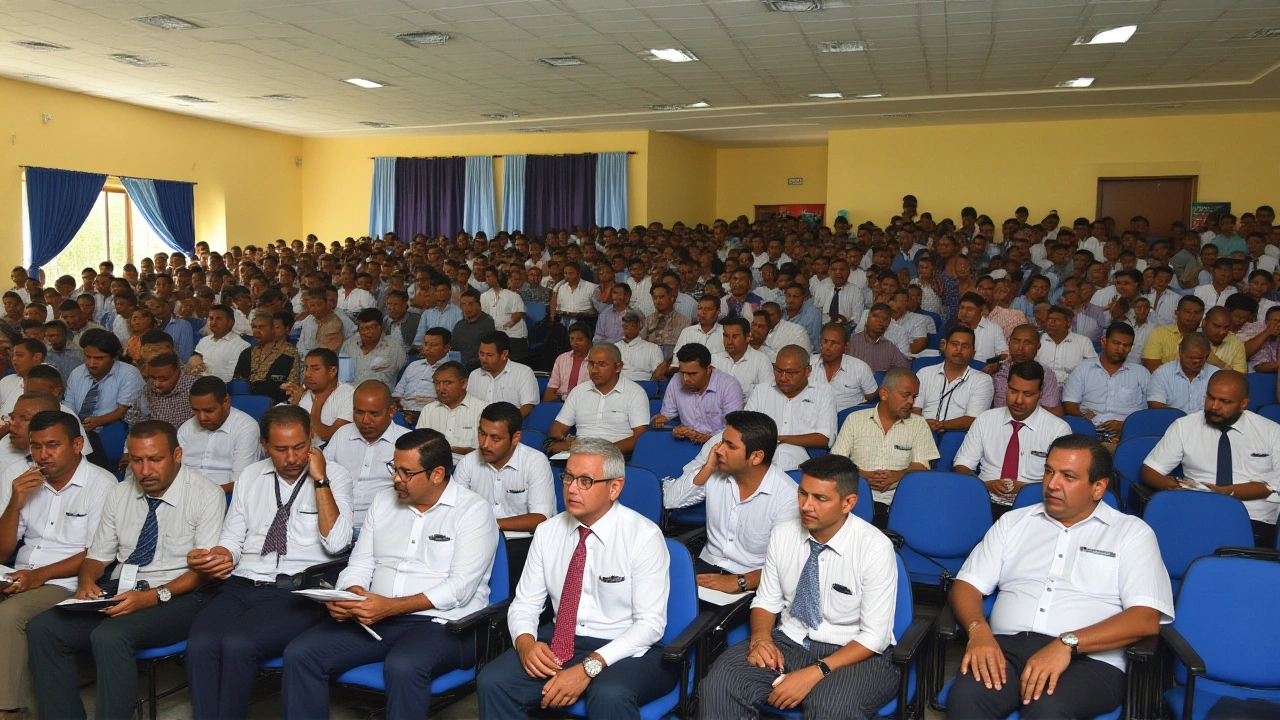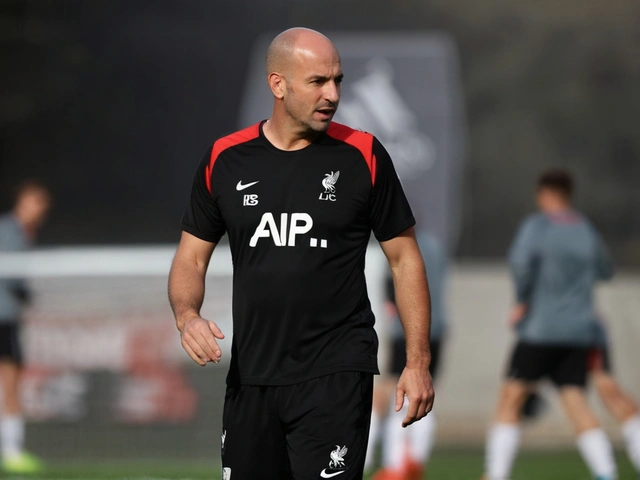
Nigeria's education loan programme, the Nigerian Education Loan Fund (NELFUND), has just disbursed ₦86 bn to 449,000 students, a milestone that has already drawn parliamentary scrutiny. The figure comes from NELFUND’s Daily Status Report dated August 26 2025, covering disbursements up to August 6 2025. In an interview on Sunrise DailyChannels Television, Akintunde Sawyerr, Managing Director of NELFUND, explained how the fund’s rapid scaling is reshaping access to higher education.
Rapid Growth of the Disbursements
According to Sawyerr, 742,000 applicants have registered on the NELFUND portal, with 735,000 completing the full application process. Of those, 449,000 have already received either tuition payments, stipends, or both. The breakdown is stark: ₦47.6 bn went straight to 218 federal and state‑owned universities, polytechnics, and colleges of education for tuition, while ₦38.7 bn was handed out as monthly upkeep allowances covering accommodation, meals and transport.
The disbursement curve looks almost exponential. In February 2025, the fund had released just ₦32.8 bn; by April it rose to ₦54.2 bn, June saw ₦59.8 bn, and August topped out at ₦86.3 bn. Sawyerr attributed the jump to three factors: a smoother portal interface launched on May 24 2024, a broadened list of approved institutions, and a verification system that now works hand‑in‑hand with university finance offices.
- Feb 2025: ₦32.8 bn
- Apr 2025: ₦54.2 bn
- Jun 2025: ₦59.8 bn
- Aug 2025: ₦86.3 bn
New applications are flooding in at a rate of roughly 3,000‑3,500 per day, according to the portal’s dashboard. By August 11 2025, the system logged 731,140 registrations, and 720,732 had successfully cleared the eligibility checks—a 98 % success ratio.
How the Loan Programme Works
Students apply through the online portal, upload their admission letters, academic transcripts and a bank verification slip. Once approved, NELFUND either pays the university directly for tuition or transfers the allowance into the student’s bank account in monthly instalments. The fund’s design mirrors a hybrid of a scholarship and a low‑interest loan: tuition is fully covered, while the stipend portion is repayable once the graduate earns above ₦300,000 per month.
The stipend ceiling sits at ₦30,000 per month, which many beneficiaries say eases the burden of living expenses in Lagos, Abuja and other high‑cost cities. "It’s the first time my family can think about university without selling the house," said Aisha Ibrahim, a third‑year student at the University of Ilorin who received ₦200,000 in total allowances.
Political Backing and Policy Context
The scheme is a flagship component of President Bola Ahmed Tinubu’s ‘Renewed Hope Agenda,’ which pledges universal access to higher education regardless of financial standing. In a 2024 speech, Tinubu promised to “remove the cost barrier that keeps bright minds from the classroom.” NELFUND, established under the same agenda, now stands as the largest government‑backed student‑finance operation in the country’s history.
Even as the programme expands, the House of Representatives has moved to investigate alleged breaches of the Student Loan Act. A resolution passed on August 20 2025 calls for a committee to audit loan disbursement procedures, verify compliance with repayment terms, and examine any undue deductions.
Scrutiny and Controversies
While the numbers look impressive, the programme hasn’t escaped criticism. The Independent Corrupt Practices and Other Related Offences Commission (ICPC) has opened a probe into reports that some institutions are deducting illegal fees ranging from ₦3,500 to ₦30,000 from the tuition amounts paid by NELFUND. NELFUND officials have categorically denied any mismanagement, stating that they have forwarded the concerns to the Ministry of Education for immediate action.
Student unions, however, remain uneasy. The National Association of Nigerian Students (NANS) released a statement on August 22 2025 urging the government to tighten oversight and ensure that the stipends truly reach the intended recipients. "We applaud the scale of the fund, but transparency must match ambition," the statement read.
What Lies Ahead for Nigerian Students
Looking forward, NELFUND plans to process applications for the 2025/26 academic year, aiming to onboard another 150 institutions, including several private universities that have recently met the accreditation criteria. Sawyerr hinted at a pilot “digital wallet” system that would allow real‑time tracking of stipend deposits, hoping to allay the concerns raised by the ICPC.
For parents and students, the impact is tangible. A recent survey by the National Bureau of Statistics found that 62 % of households with a beneficiary reported a reduction in overall education‑related spending, freeing up resources for health and nutrition. If the programme sustains its current pace, it could fund close to half a million graduates by 2027, dramatically reshaping the nation’s skilled‑labour pool.
Frequently Asked Questions
How does the NELFUND disbursement affect university finances?
Universities receive tuition payments directly from NELFUND, which helps them cover operational costs without waiting for student fees. This steady cash flow has allowed many institutions to settle staff salaries on time and invest in learning resources, according to the Vice‑Chancellor of the University of Benin.
What steps are being taken to address the illegal fee deductions?
The ICPC’s investigation focuses on tracing the chain of payment from NELFUND to the institution’s finance office. Meanwhile, NELFUND is piloting an electronic receipt system that logs every transaction, making it harder for schools to impose hidden charges.
Who is eligible for the stipend portion of the loan?
All students who have secured a full‑tuition award through NELFUND and are enrolled in an approved public or private tertiary institution qualify for a monthly upkeep allowance of up to ₦30,000, provided they maintain a minimum CGPA of 2.5.
When will the repayment period begin?
Repayment of the stipend portion starts 12 months after graduation, but only if the graduate earns a monthly income exceeding ₦300,000. The loan is forgiven after ten years of consistent repayment.
What is the long‑term goal of the NELFUND programme?
The government aims to fund at least one million students by 2030, thereby widening the skilled workforce and supporting the broader objectives of the Renewed Hope Agenda to boost economic growth through education.
17 Comments
Darshan M N
October 24 2025
yeah, the rollout looks smooth but i think it’s mostly about getting students into schools fast.
the tech upgrade probably helped a lot.
manish mishra
October 25 2025
Honestly, the hype around the fund’s growth is overblown – it’s just a bigger version of the same old scheme, nothing magical.
People love the numbers, but the real impact is still limited to a fraction of the needy crowd. :)
tirumala raja sekhar adari
October 25 2025
i cant even see why anyone would be impressed – it’s just more paperwork for the same old headaches.
also the whole “digital wallet” idea sounds like a buzzword without real substance.
abhishek singh rana
October 26 2025
When you break down the NELFUND mechanism, a few key points become clear. First, the direct tuition payments eliminate the cash‑flow bottleneck that many public universities face each semester. Second, the monthly stipends, capped at ₦30,000, provide a predictable safety net for students struggling with accommodation and food costs. Third, the repayment trigger-only when graduates earn above ₦300,000 per month-means that the loan’s burden is effectively deferred until borrowers have a reasonable disposable income. Fourth, the ten‑year forgiveness clause adds an incentive for graduates to stay on track with repayments, reducing default risk for the fund. Fifth, the integration with university finance offices ensures that tuition disbursements are reconciled in real time, limiting the chance for misallocation. Sixth, the upcoming digital‑wallet pilot could improve transparency by allowing students to see exactly when and how much of their stipend has been deposited. Seventh, the program’s rapid scaling from ₦32.8 bn to ₦86.3 bn within six months suggests that the underlying IT infrastructure is robust enough to handle high transaction volumes. Eighth, the high 98 % eligibility success ratio indicates that the verification process is both thorough and efficient. Ninth, the focus on both federal and state institutions broadens access across geographic regions, which helps to reduce regional educational disparities. Tenth, the fact that private universities are being added shows a willingness to adapt the model to diverse institutional contexts. Eleventh, the partnership with the ICPC to monitor illegal fee deductions adds a layer of accountability that could curb corrupt practices. Twelfth, the survey indicating a 62 % reduction in household education spending underscores the program’s tangible socioeconomic impact. Thirteenth, the projected funding of half a million graduates by 2027 aligns with the government’s broader goal of expanding the skilled workforce. Fourteenth, the loan’s low‑interest design, combined with the tuition‑cover component, makes it more attractive than conventional bank loans. Fifteenth, the overall design balances immediate relief with long‑term fiscal responsibility, which is essential for sustainability. These factors together illustrate why NELFUND is more than just a headline figure; it’s a structured effort to tackle Nigeria’s higher‑education financing challenges.
Shashikiran B V
October 26 2025
Some claim the fund is a pure altruistic venture, but if you think about the political capital it generates for the ruling party, it’s a calculated move to secure votes under the guise of development.
Sam Sandeep
October 27 2025
The entire scheme reeks of top‑down engineering; it looks good on paper but ignores the grassroots realities where many students lack bank accounts to receive stipends.
Ajinkya Chavan
October 27 2025
Enough of the cynicism – the fund is delivering real tuition payments, and that alone is a win for millions who otherwise would drop out. Let’s focus on improving the rollout rather than tearing it apart.
Ashwin Ramteke
October 28 2025
From a practical standpoint, the portal’s new interface has cut application times dramatically, which means fewer students are stuck in limbo waiting for approvals.
Rucha Patel
October 29 2025
While the numbers are impressive, the reality is that many beneficiaries still report delayed stipend deposits, which defeats the purpose of a monthly safety net.
Kajal Deokar
October 29 2025
It is truly inspiring to witness a national initiative that strives to democratize higher education, ensuring that financial constraints no longer dictate one’s academic destiny.
Dr Chytra V Anand
October 30 2025
One must appreciate the systematic approach taken: rigorous eligibility checks, direct university payments, and a clear repayment trigger-all hallmarks of a well‑structured financial instrument.
Deepak Mittal
October 30 2025
The timing of the fund’s expansion coincides suspiciously with upcoming budget debates, hinting at a possible maneuver to sway legislative opinions.
Neetu Neetu
October 31 2025
🤔📚💰
Jitendra Singh
October 31 2025
Clearly, the program’s architects have set the bar too low; a mere ₦30,000 stipend barely scratches the surface of living costs in major Nigerian cities.
priya sharma
November 1 2025
The data suggests that while tuition coverage is comprehensive, the stipend component requires refinement to address regional cost variations more effectively.
Ankit Maurya
November 2 2025
Patriotic citizens should rally behind NELFUND; it empowers our youth and fortifies the nation’s future workforce.






prakash purohit
October 23 2025
The sudden surge in disbursements feels engineered, as if someone pulled the strings behind the scenes to showcase a success story while hiding the real paperwork.
Such perfect numbers rarely happen without a hidden ledger, and the timing aligns suspiciously with upcoming elections.